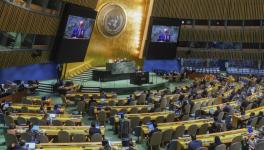World Cup 2022: How Frappart and Co. Overcame Misogyny
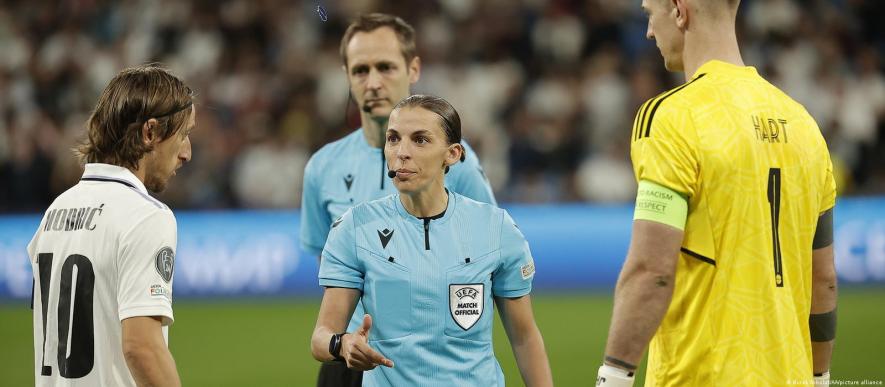
The last time Neuza Back was in Qatar for a game, she was part of the officiating team at the 2020 FIFA Club World Cup Final, as European champions Bayern Munich beat Mexican giants Tigres 1-0 in Al Rayyan.
Back, from western Brazil, had already officiated top-level games in her homeland, as well as the 2019 World Cup in France. Now she was reserve assistant referee at FIFA's flagship club event, alongside her compatriot Edina Batista, the fourth official.
At the post-match presentation ceremony, Sheikh Joaan bin Hamad Al Thani of the Qatari royal family jovially bumped fists with male players and officials as they filed past him to collect their medals. But when Back and Batista reached the sheikh, he appeared to look right past the two women as though they did not exist.
While Islamic law prohibits men from physically touching women who are not members of their immediate families, it does not restrict them from being courteous by lowering their eyes and making gestures not related to touch.
Footage of the incident quickly went viral. Organizers insisted it was a "minor misunderstanding" related to COVID-19 hygiene protocols, but it was interpreted by Qatar critics as further evidence that the Gulf state with its strict laws is unsuited to hosting global sports events.
Sheikh snubs shake: Qatari royal refuses to acknowledge female officials with a fist bump during FIFA Club World Cup awards ceremony- pic.twitter.com/BmeebGjgVt
— Blanche Victoria (@tammytabby) February 12, 2021
Now, along with Karen Diaz of Mexico, Back is set to help officiate Germany's World Cup Group E decider against Costa Rica on Thursday as one of the assistants to central referee Stephanie Frappart, who herself will become the first female referee to take charge of a men's World Cup fixture.
The trio are three of six women on the 129-member officiating team at the tournament, which also includes assistant referee Kathryn Nesbitt (United States) and central referees Yoshimi Yamashita (Japan) and Salima Mukansanga (Rwanda). So far in Qatar, Yamashita has seen the most action, being deployed as fourth official in four games with at least one more to come when Canada face Morocco, also on Thursday. Mukansanga and Frappart have also worked on two games as fourth official.
But all eyes are now on Frappart, Back and Diaz as they take center stage. And, though the ratio of female referees to male referees at the tournament remains low, analysts say the move is significant, especially in a country like Qatar where women can, quite literally in the case of Back and Sheikh Al Thani back in 2020, be overlooked.
"That it is happening in Qatar is a powerful statement," said Erin Blankenship, co-founder of Equal Playing Field, a nonprofit pushing for better representation of women in sports.
"I don't expect the World Cup to have a 50/50 gender split," Blankenship said. "But I think it's getting to the point where it doesn't matter what gender you are: If you're good at your job you have every right to be on that field. For me, that's the goal."
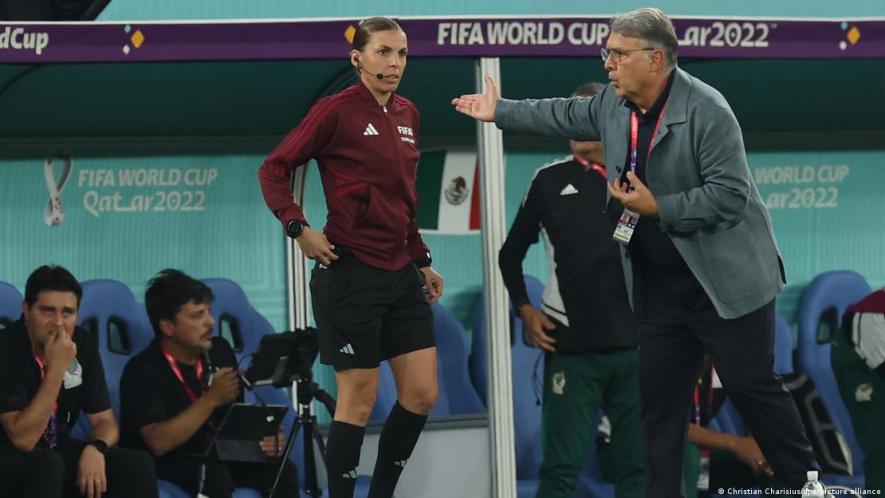
Time to take center stage: Frappart and her female colleagues have thus far been deployed as fourth officials
A token for gender equality?
Not everyone considers female referees at the World Cup to be a positive change. Some football fans, notably men, have trolled the referees and denounced what they call a takeover of men's space.
Frappart, who will be at the center of attention of Thursday, has taken more flak than most. The 38-year-old is one of France's top referees and became the first woman to officiate a men's UEFA Super Cup final (Liverpool vs. Chelsea) back in 2019, as well as a men's UEFA Champions League game (Juventus vs. Dynamo Kyiv) in 2020.
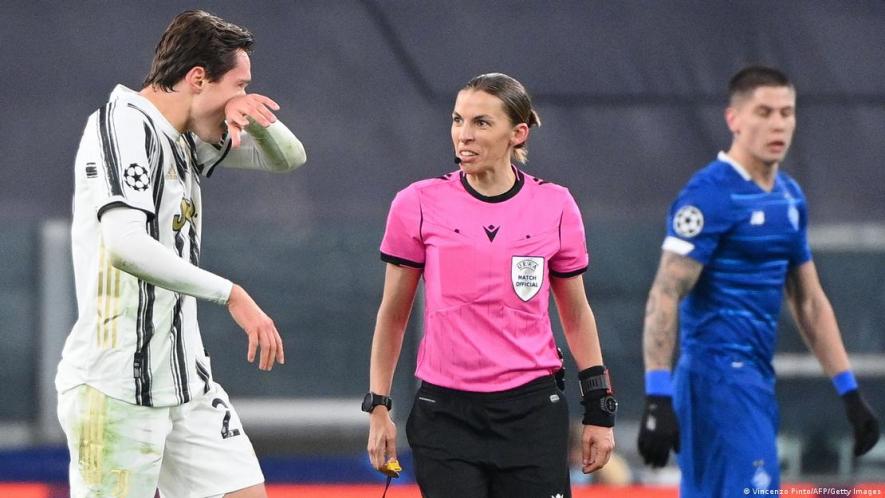
Frappart became the first woman to take charge of a men's Champions League match in 2020
With an agile gait and an intense game face during matches, Frappart is also an intercontinental force, having been on the FIFA international referees list for over a decade and officiating high-profile games such as the tense World Cup 2019 final, which saw the Megan Rapinoe-led US team defeat Netherlands.
But Frappart's success is a double-edged sword. The higher the profile, the greater the criticism, with former French international Jerome Rothen even dedicating a radio show to discrediting her Qatar selection, saying she is "not up to scratch."
"When people say this, it's because they think that women will never be good enough for the best leagues, which happen to be men's games," said Blankenship. "But the female athletes who make it this far are usually the women prepared to push back and who have climbed many invisible mountains."
Nervous, but ready
While Frappart continues to battle chauvinism in France, her colleague Salima Mukansanga has faced different challenges in Rwanda.
Though Rwanda is ruled by the male President Paul Kagame, nearly two-thirds of parliamentary seats are held by women.
Football referees, both male and female, are still the enemy to fans, including Mukansanga's own father, who would berate the officials when his team lost.
When she was a girl, Mukansanga saw the referees, who command the players, as the most important figures in the game. So when she completed her secondary education at 15, she headed straight into refereeing, steadily working her way up from the local Rwandan leagues to officiating some of the most important tournaments in the world.
The 33-year-old made headlines earlier this year when she became the first woman to referee two games at the Africa Cup of Nations tournament in Cameroon.
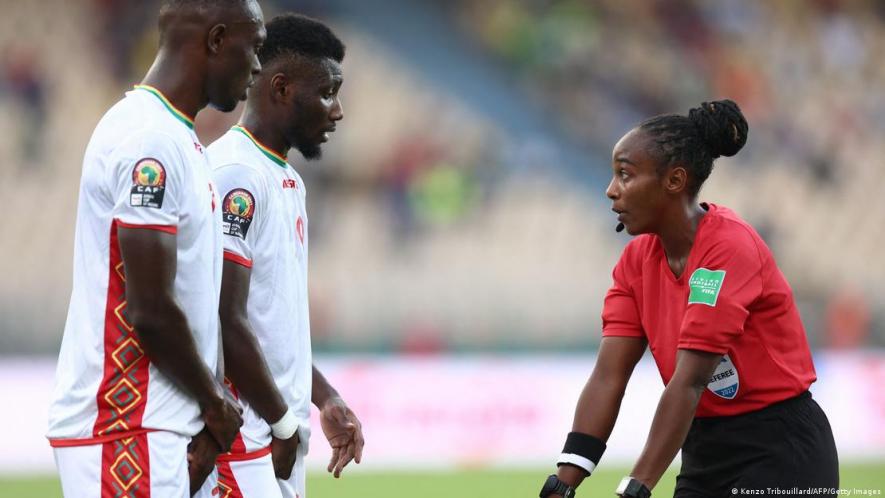
Mukansanga decided she wanted to be a referee at an early age
Before kickoff, Mukansanga was nervous, she told DW. There's greater pressure with men's games, because of the higher standards and because she is one of the first females to handle senior men tournaments. The support of excited fellow Rwandans weighed on her.
But she overcame her fear. As Zimbabwe defeated Guinea, Mukansanga's face was an unreadable canvas as she sprinted after players with eagle-sharp eyes, oblivious to the audience stunned at the sight of a female referee.
When a Guinean forward patronizingly touched her arm to suggest that she reconsider a teammate's yellow card, Mukansanga said: "Do you want one yourself?" The forward very quickly left the scene.
Beyond Qatar
There are still several arguments to make for better female representation in sports, but for up-and-coming female referees, Qatar's referee lineup is confirmation that qualifications are taking precedence, said Eva Lotta Lockner, an amateur referee in the German city of Hamburg.
It means "that we actually stand a chance in getting selected for major male tournaments if we put in the work and show ambition," Lockner said.
Blankenship added that, though FIFA's move is commendable, what happens after Qatar is just as important.
''I am psyched that this is happening. But let's take responsibility for institutional barriers against women and let's remove them," she said.
Edited by: Matt Ford and Matt Pearson
Get the latest reports & analysis with people's perspective on Protests, movements & deep analytical videos, discussions of the current affairs in your Telegram app. Subscribe to NewsClick's Telegram channel & get Real-Time updates on stories, as they get published on our website.












